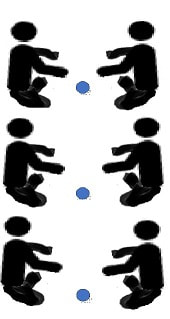 This is an excellent game to review or teach targeted vocabulary. I again learned it from a Spanish colleague (magistra callidissima). In Spanish class, they seem to use it to teach body parts but I adapted it to verbs -more useful for my purposes. To play, choose 7 verbs that can be associated with hand signals to suggest the meaning of the word. Four were new and three they had previously learned. With the class sitting in front of me, I taught them a hand signal for each verb: scribere - pretend to write in the air legere - put your palms together and then open them up like a book spectare - put your hand to your brow like you are looking for something lacrimare - rub your eyes like you are crying dormire - put your palms together under your head like a pillow and tilt your head intrare - using your index finger and your middle finger "walk" them towards you discedere - same as before except walk your fingers away from you Note: No need to use infinitives here. I used the third person singular because it was the only form of the verb my students knew at the time we did this game - use imperative forms if your students are familiar with them. We practiced these signals for a few minutes until everyone seemed to get it. Then I told them that they verb "capere" meant to take and this would be the "signal." ("For what?" they asked. "You'll see," I said.) After this, I divided the class in half and had them sit cross-legged on the floor in two rows facing each other. Each person sat directly across from someone else (about a foot apart). Three can play if you have an odd number. In between each pair, I placed a small ball. (Actually it was some dried walnuts, decorative wooden yams and some other random stuff that I found by turning my house upside down at 10 pm the night before.) The object needs to be durable, not roll around on the floor, and small enough to be grabbed and covered by one person's hand so that the other person can't grab an end and start a tug of war. A haki-sac would have been perfect if I had owned 10 of them... To play the game, you yell out the verbs and have the students make the various signals for the verbs. You then yell out "capere" and both partners have to try to grab the ball/ walnut..whatever. The winner is the one who grabs the item first. Rotate partners and play as long as you can stand it. I was pretty bored of yelling out verbs long before the class tired of it. We also had one line move up so that everyone got a new partner every two rounds. To the right is a diagram of how to set up the game. Verb mastery in 15 minutes! If moving desks is too difficult, you can place the item in the middle of a desk and have the students stand on either side of the desk instead. I have not personally tried this but may the next time we play.
0 Comments
This game is a relatively new addition to my collection. It has been very popular. I learned about it from my Spanish colleague, Joan Conner who used it successfully with her class. Multas Gratias! It is a great warm-up for a long block (80 minutes or more) or simply a great activity on its own when students simply can't sit any more. Game Prep: Ridiculously simple - always a a feature for me. You take about 20 pieces of 8x10 pieces of paper and write phrases on them that you want your students to become more familiar with. You can of course just write words but I think phrases work better. Here's a sample of some phrases I recently used. These are phrases based on Chapter 14 in Ecce Romani but of course any phrases will work. If you have a more concrete vocabulary list, you can make pictures instead of Latin phrases. This of course will take longer but ultimately is better for acquisition. There should be at least one paper with a different phrase for each student. I would suggest making at least five extra. The second thing you need is a pool noodle or some other soft instrument a student use to "bop" or "tuxtax" someone's desk. Pool noodles are perfect because they are about 4 feet in length, make a satisfying thwack when they hit a desk but are completely non injurious. Having no pool noodle, I bought a piece of pipe insulation about the same length as the pool noodle. Works just as well and was less than $2.00 to purchase. Sweet. How To Play: Instruct the students to put their desks in a circle. There should be about 4 feet from the center of the circle to the desk. This isn't crucial but whoever is in the center should be able to get to reach the desks in one or two steps. Make sure that students are spread evenly around the circle. Now hand out the pieces of paper with the phrases on them. it's a good idea to have students pass the papers around making sure that everyone can read all of them. Instruct the students to hold up their paper with the words facing into the circle. Now find a volunteer to stand in the center of the circle with the pool noodle. You as a teacher yell out one of the phrases. Perhaps if you are using my set, you might yell, "Don't turn." If you have pictures instead of Latin phrases, the student would yell out the Latin for the picture. For example, you might have a picture of girls running, you would yell out, "Puellae currunt." Now the person with the noodle has to look around the circle and identify the picture or phrase that was just called out and go over and smack the desk of the person holding that paper. The student holding the paper whose phrase was just called out has to call out another phrase in the circle. If he or she succeeds in calling out one of the phrases before the person with the noodle smacks their desk, then the noodle person has to now find that phrase. Of course, if the noodle person smacks their desk first, now that person is in the center and the person with the noodle takes their place in the circle. Play continues like this for about 20-30 minutes. Tips to Make this Game Work:
 This game is one of those that students will remember for the rest of their lives. I have been doing it for 20 years with students in grades 6-12 and it has always been a huge hit. With poor classroom management, it can be a huge headache due to the excitement it creates. Use this activity sparingly- on a special day, possibly the day before vacation when quiet and order is not generally expected. To play this activity, you need approximately 20 sentences, or grammatical problems you want students to read or solve. They should be fairly difficult but not impossible. You also need a pile of costumes or crazy clothes. As an ex- drama teacher, I have these in abundance. They don't have to be full costumes and in fact it works better if they aren't. You need scarves, aprons, jackets, crazy glasses, skirts - pretty much anything weird and/or sparkly will do. The procedure is fairly simple. Arrange the class in a circle so that everyone can see everyone else Hand out the sheet that has the 20 sentences or questions on it. Students will need pencil and paper or white boards. Have students write the answer to your first question -translate this sentence, write ambulare in the first person, imperfect tense. It really doesn't matter. Students then hold up their answers and everyone who got the answer wrong has to wear a piece of clothing from your costume pile. After everyone is dressed, repeat. The winner is the student wearing the least amount of clothes at the end. That's why its called UNstrip grammar. Its about putting on clothes NOT taking them off. Get it? This game is one that you can guarantee will NOT be played in any other class. Students will talk about it for the rest of the year. "Remember when Malcolm wore...." Part of my goal has always been to make my class memorable even legendary. News of this game will spread far and wide. It's a seed being planted in those hearing the stories. You mean there are monsters AND costumes in Latin?? Hmm.. Maybe I should take Latin. Tips to Make this Activity Work
When Linda Kordas, the sapientia magistra from Concord NH explained this game to me, I was dubious. It seemed too simple. I didn't think that a game that had only two rules and no props could be successful. I was wrong.
This is an excellent game to play when students have a good grasp of a concept. It is an excellent test or quiz review activity. I find it particularly useful to help students remember how to form cases and verb tenses. To play Considite, you divide your class into two or three teams and call a representative from each team to the board. Students at the board takes a marker. You then tell students to write a word in the accusative, dative, verb in the imperfect - whatever you are practicing. The first student who writes the word correctly, "sits down" by the board. Actually, they just crouch down but that's good enough. For this game, if you are reviewing how to put endings on words, it is helpful to list 5 words at the top of the board that you will use. Students often "blank out" on the word even if it is one they know very well when they are standing in front of their peers. For example, if I was using this game to practice forming the accusative case, I might write puella, equus, scutum, hortus and puer on the top of the board and only use those words. The other rule is that the word MUST be legible. If neither student is able to write the correct word, I may give some hints, give the answer or give them another word. If a student has crouched down and written the wrong answer, I tell them that it is not correct. They can stand back up and try again. The first student that has written the correct word with the correct ending and crouched down gets a point for their team. Then, two more people are called up and play repeats. This game has a running time of about 20 minutes before it becomes old. Variations: Practice with Numbers: Draw six rabbits! This game is a lot of fun to use with numbers. I teach students basic animals - canis, porcus, leo, felis are good ones as well as puer and puella. I think call two students up and tell them, "Delineate quinque leones." They start madly drawing lion type shapes. (They often look like fried eggs but whatever) The first student to draw five lions and crouch down gets a point for their team. Practice with Comparative and Superlative Adjectives: Draw a bigger rabbit! This game also works well to practice comprehension of comparative and superlative adjectives, particularly those irregular comparative and superlative adjectives: melior, optimus, peior, pessimus, maior, maximus, minor, minimus. Again, use a finite set of nouns - animals are always fun. Ask students to draw for example, "peiorem canem." Students will complete to see who can draw the worse looking dog. For the "maximum porcum" They will be competing to see who can take up most of the board. This is a great way to get a lot of practice with these common but often unrecognized adjectives. Tips to Make This Game Work:
 Warning: Students' imaginations may surpass your drawing ability Warning: Students' imaginations may surpass your drawing ability This is a terrific review activity that can be used at many levels. It is best used to see if students have masted a grammatical concept in context with other concepts. The goal of the game is to be the first team to move your chariot all around the track. It involves galloping horses, straining to surpass each other. It looks like this! Required Materials: What it really involves is 5-6 magnets and the ability to draw or project a racetrack with 5-6 "spaces" on your board. Below is an example of one of my own "Circus Maximus." Pitiful- I know but progress around this misshapen doughnut promotes much excitement. Nascar caption was snuck in by a student at the end of the class. The magnets were made by buying a pack of magnet blanks from Staples and then gluing on a picture of a chariot. I then then colored each chariot in different race colors. Before I did this, I simply used 5 random magnets I had in my house. The magnets work as the teams' markers so their shape isn't really important. Pre-Game Set Up:
Divide your class into teams of three or four. If you have two strong students left over, you can have a dynamic duo. It is important that the teams be balanced in terms of ability otherwise one group may very quickly get discouraged. You now need to come up with five sentences - or more - one for each space on the track that practice the concept that you just taught for students to write in Latin. You can also generate five sentences to translate but I find this activity works much better for writing in Latin since the group needs a thoughtful problem to work out. Now, generate extra sentences - a different one for each team and write each of those on an index card. How to Play: Draw your race track and stick your magnets on the first space At the beginning of the game, announce the teams of students and tell them to get together with their group with all their Latin resources: text book, reference charts etc. Tell them to appoint a writer - someone on the team with neat handwriting and a runner. Have each team choose a colored magnet which to represent their team. Now here's the main action: Write one of your sentences on the board and tell the teams to write it in Latin. The must write the English first and the Latin below it. Once they feel they have it correct, the runner brings it up to the front of the room. You read the sentence and underline in red what they have wrong. I tend to underline the whole word if they have the wrong word or just the ending if the ending is wrong. Don't say anything - just underline the incorrect bit. The runner then dashes back to his team and they hash out the problem and bring up the new version - rewritten. Before they bring it up again - THEY MUST REWRITE THE SENTENCE. This is important. Otherwise, you will never be able to tell what has been fixed and what hasn't. Insist on this or you will go blind trying to navigate hastily crossed out words and endings. Once they have it correct, you put a big check on it and the runner moves the magnet to the next space. AS soon as one team has correctly written the first sentence, you write the next sentence on the board and the play continues until the first and second team goes all the way around. About the Index Cards: At the beginning of the game, give each team one index card with the extra sentence. These are rotae fractae, broken wheels. At any time, a team can hand one of their cards to another team. When this happens, the team with the "broken wheel" must translate that sentence before moving on. This way a team can slow down another and make the game more competitive. Tips to Make the Game Work:
For this tried and true activity, I must credit the incomparable Nancy Emery. She invented it, shared it with me and it has never failed me. Debeo te, magistra. This is another game that can be played with levels 1-3. It will get your students moving around the room but it is not as intense as flyswatter or the Verb Olympics. This is a team game. It works best when you have teams of not more than 3-4 students. It requires very little set-up and the whole game takes about 30 minutes. The instructional goal is to get students to look closely at a text and parse the different cases, parts of speech, tenses of verbs or whatever you happen to be studying. To play this game, you need:
Before the Game: Write at the top of each piece of paper, one grammatical component that can be found frequently in the text you have selected. For example, plural nouns, accusative words, verbs in the imperfect tense, feminine nouns are things that might be written on the top of pieces of these pieces of paper since they are plentiful in many of the stories that we read. Then hang these pieces of paper up around the room where there is space for students to be gathered in front of it. Thoughtfully pre-divide your class into teams. This works best when the teams are about even in ability. To Play the Game: Announce the teams to the class. Now give each team a different color marker (this will be important later) and tell them to appoint a writer for the team. This team member should have the most legible handwriting of the group. Tell all the students to bring their copy of the text and assign each team to stand in front of a different piece of paper. When you give the signal, each team is to look for the grammatical items in the text as indicated by the label on the paper. For example, let's suppose one team is standing in front of a piece of paper labeled "Feminine Nouns". Looking at the text, the team directs the writer to write as many feminine nouns as they can find in the text. After about 30 seconds, yell "switch" and direct everyone to move clockwise to the next piece of paper where they must find the next thing. Perhaps this paper says "Words in the Ablative." The group scours the text again and the team's writer lists as many words in the ablative as they can find. Teams cannot repeat words that have been already been written unless that word is repeated in the text. Part II: The Competition Begins Once each team has been to each piece of paper, (all around the room) tell the students to bring all the pieces of paper to the front of the room and tape them to the board where the class can see all of them. Appoint one student to be scorekeeper and have them list all the teams, as indicated by the color marker that you gave them. Read through all the entries on each piece of paper and ask the class if they think they are correct. If however, someone finds one of the team's answers incorrect, they can challenge it and get a point for their team. If however, the challenger is wrong, then they lose a point for their team. I find that students during this phase of the game really do study their competition's list of words. Suddenly students really do want to hotly debate if a noun is ablative or accusative. In class, this question usually provokes a bored silence. The winning team is the one that has the most points. Usually I have the student in charge of keeping score announce third, second and first place. Afterwards there is lots of cheering. The entire game takes about 30 minutes. Here again, I must credit the amazing Linda Kordas for this idea. It's another winner - one that works well with Latin 1-3. The scoring system was my own addition. I came up with it on the fly when I realized I had too much time left in class after the initial "Around the World" In teaching, desperation rather than necessity is more often the mother of invention. Tips to make this game work:
Here is the link to the Google drive that contains the folder for Kinetic activities as well as everything else
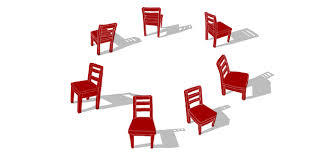 Musical chairs is probably the most fun you can have practicing noun-adjective agreement. Once students understand the concept of noun-adjective agreement across declension, it's still difficult to get them to commit the ending pairs to memory. This game will not clarify it for them but once students have the general idea and some of the ending pairs committed to memory, it will make practicing the concept a great deal more lively. Pre-game Preparation: You write one form of a first and second declension noun in large letters on an 8x11 piece of paper. You might, for example have villa, villae, villis, villarum, servus, servi, servo and some forms of a neuter noun as well on different pieces of paper. Each piece of paper with the noun written on it will be placed on a chair. In this game, It is not necessary to have one less chair than there are students. It's good to have as many chairs as you have students. However, if you have a larger class 15+, you can have less chairs. There's no set ratio here. Unlike regular musical chairs, you won't be eliminating chairs. Make as many index cards as you have students that has three forms of a third declension adjective numbered 1-3. For example, one card might say: 1) fortis 1) fortia 2) fortem or 2) fortes 3) fortibus 3) forti Each card should be different. Each card should contain singular and plural forms of a third declension adjective. Each numbered adjective should match at least one noun that is placed on the chairs. Right Before You Start the Game: Put a number of chairs in a circle or semi-circle. Since my desks are attached to chairs, we tend to play Latin musical desks. Then, put one of the pieces of paper that has a first or second declension noun on each of the chairs. To begin, ask the students to walk around the chairs and notice what cases the nouns are. Hopefully, they will notice that some of the nouns could be more than one case. For example, villae could be both genitive singular and nominative plural. Then give each student an index card with the three forms of the third declension adjective and ask them to determine which adjective form goes with which noun. How to Play: Students walk around the chairs to music. I personally like to play medieval bagpipe music for this activity but your tastes may be different. Then you turn off the music and yell out a number (one, two or three). The student must go to the chair that matches that numbered adjective on their card. For example, using the first example cards above, if I yelled out "Number two!" the student would need to find the chair that matched fortem. After everyone scrambles to a seat, you walk around and check that those players that are seated have correct noun-adjective agreement. Here, I find it is useful to appoint one student to be an assistant and have them help check. There's usually one student in each class that gets this right off the bat - make that person your helper for this activity. Anyone who didn't find a chair, didn't get to a chair in time or is seated in the wrong chair gets an "S." For the next wrong answer, they get an "E." I spell out the word sella. No one is eliminated from the game, nor do you remove chairs. After two or three times around the chairs, ask students to switch index cards with another student. I find that about 20 minutes of this is enough. When you feel that you have reached the end, ask students how many letters each of them has and declare a winner. Some Notes about the Game: This will be chaotic - there's no getting around it. It is the Mad Hatter's tea party version of musical chairs. You will find that sometimes nearly everyone will get a seat and other times, everyone can only use three seats. I'm sure there's a way to map out the ratio of adjectives to nouns to make it more even, but that's beyond my mental capabilities. This game is best played with a group that is generally well-behaved and responsive. You can use Flyswatter or the Verb Olympics to corral a difficult group but this game really requires cooperation right out of the box to work. However, with a good group - this is a truly memorable activity, especially with bagpipe music. Trust me - you gotta play the bagpipe music. The Verb Olympics is a grand title for a deceptively simple idea. It is a relay race to practice conjugating verbs. I use it quite a lot because it works amazingly well to teach as well as motivate students to conjugate verbs correctly. Students always do better on tests that involve conjugating verbs when we have had a round of the Verb Olympics the day before.
Basically, you divide your class into two or three teams. If you have more than 15 students in your class, divide them into three teams, less than 15, divide them into two. You then let each team choose a country to represent. Because I teach middle school, Djibouti pronounced (Ji- BOO - tee) Get it? is usually represented along with several other random nations. Whatever. The next step is to for each team to choose a captain. I tell the team that the team captain must be someone who gets how to conjugate whatever tense of verb we are working on without using a reference sheet. After a minute or two of arguing, one captain from each team steps up to the board. The job of the team captain is to make sure that the process of conjugating stays on track. The captains themselves may not write but they can instruct others what to write. That way if someone blanks out under pressure, they can rely on the team captain to tell them what to write. To play, the teacher writes a verb on the board to conjugate. All three teams compete simultaneously to be the first to conjugate the verb correctly. One by one, each member of the team must run to the board and writes a form of the verb. The first person runs up and writes the first person singular, the second person writes the second person singular etc. Each person must hand off the marker and run to their seat before the next person comes to the board. When all the personal endings of the verb has been conjugated, the team sits down. The first team to have it completed it correctly, wins a point for their team. If there are three teams, I usually award two points for first place and one point for second. If the first team finished does not have the verb conjugated correctly, I tell them that they have not won and then let them argue over where they went wrong. Meanwhile if one of the other team finishes the task correctly, then that team wins. Again, the team captain can't write anything, he or she must get one of their team members to fix wherever they went wrong. I can only take credit here for the name of this game. The amazing German teacher at Concord High School, Laura Ernest, explained the process to me. While the idea of relay races is certainly not new, her addition of a team captain standing at the board to keep the task from completely running off the rails makes this work well. This activity instructs, engages, and requires no preparation or technology to implement. All hail the Verb Olympics! Citius, Altius, Fortius 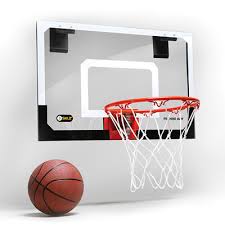 Latin basketball has been another huge success. To play Latin basketball, your students need not be athletic, or know how to play basketball. To play Latin basketball, you need some sort of basket and a hoop. For several years, I borrowed the Spanish teacher's basketball hoop and had the students throw a dog toy through it. Eventually, I got around to buying my own. I spent approximately $20 at Olympia Sports for this item. Had I been less lazy and gone several more blocks to the local drugstore, I could have gotten it for half the price. Pictured here is one such item, I think, from Amazon. It's a step up from my purchase but any hoop that you can clip to your whiteboard should work just fine. To play Latin Basketball, you need to divide the class into two teams. The first team lines up along a pre-determined free throw line and attempts, one at a time, to throw the ball in the basket. It helps to have someone under the basket to get the rebound. While team #1 is making baskets, team #2 is doing some Latin related task that may take some time to finish. For example, they may be declining nouns or conjugating verbs. Perhaps they are writing the correct form of first and second declension adjective that go with a series of third declension nouns. I give each team member a small whiteboard for this activity, but this could be done on paper as well. When everyone on team #2 has the task done and correct, then time is up for team #1. Now the teams switch and it's team #2's turn to make baskets and team #1's turn to complete the task. We usually have time for 3 rounds of play for this game in a 40 minute period. The winner is the team that has scored the most points at the basket. The great thing about this game is that it motivates even the most disinterested Latin students to do these rote memorization tasks such as declining and conjugating, correctly. Students can share their answers with each other, but no one wants to be completely reliant on someone else's answers. That would slow down the team. "Which vowel do I add to the verb? How do you know what the stem of this noun is?" Students who had been oblivious to your thousand time repeated explanation will suddenly want to know and remember so they can finish the task more quickly in the second round. For this fine activity, I need to thank Jill Jackson, a charismatic and resourceful Spanish teacher, who had found it first and generously shared it with me - Muchas Gracias, Senora. |
- Salvete Omnes!
- About Me
-
The Stuff is Here
- Beginning Activities
- Card and Board Games
- Kinetic Activities: Get 'em out of their seats
- Mad-libs for All Levels
- Miscellaneous Low or No prep Activities
- Movie Talks!
- Stories Not in Your Textbook
- Stuff for Advanced Students
- Teaching Case
- This I Believe
- White board Activities: Winning.
- Writing in Latin with Students
- Mythology RPG
- Songs
- Quid Novi?
- Links!
- TRES FABULAE HORRIFICAE
- LEO MOLOSSUS
- OVIDIUS MUS
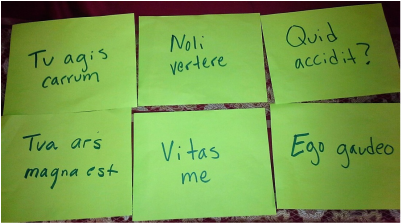
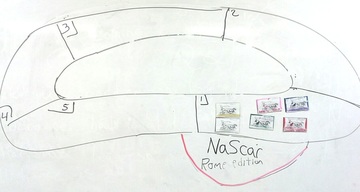

 RSS Feed
RSS Feed
